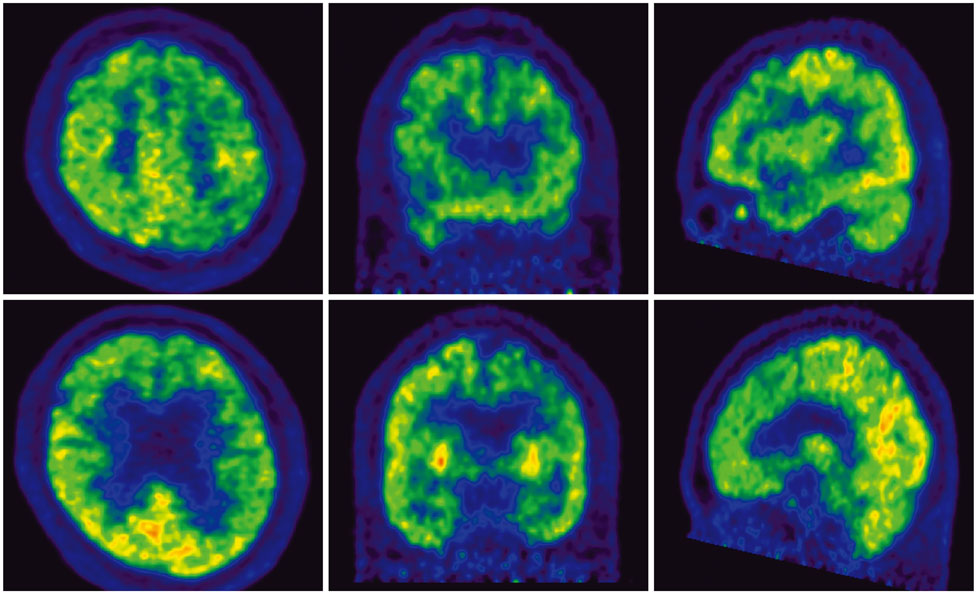Dement Neurocogn Disord.
2016 Dec;15(4):165-169. 10.12779/dnd.2016.15.4.165.
Frontotemporal Dementia with Motor Neuron Disease in a Patient with Antiphospholipid Syndrome: A Case Report
- Affiliations
-
- 1Department of Neurology, Hanyang University College of Medicine, Seoul, Korea. chj@hanyang.ac.kr
- KMID: 2442844
- DOI: http://doi.org/10.12779/dnd.2016.15.4.165
Abstract
- BACKGROUND
Frontotemporal dementia (FTD) with motor neuron disease (MND) is a syndrome of progressive changes in behavior, language, muscle weakness and atrophy due to loss of function of neurons in the frontal and temporal lobes and in motor neurons. Etiology and pathogenesis of FTD with MND are still uncertain.
CASE REPORT
A 71-year-old man presented with a 2-year history of progressive muscle weakness and cognitive deficits. We diagnosed this patient as FTD with MND by neurological examination, electromyography, brain imaging and neuro-psychological evaluation. We also confirmed antiphospholipid syndrome (APS) in this patient as a way to rule out secondary causes of MND.
CONCLUSIONS
This was a very rare case of FTD with MND in APS. We should focus study on the possible role of autoimmune pathogenesis in FTD with MND.
MeSH Terms
Figure
Reference
-
1. Rodríguez de Rivera FJ, Rambold HA, Díez-Tejedor E. Assessment of cognitive impairment in amyotrophic lateral sclerosis. J Neurol Sci. 2014; 337:1–2.
Article2. Burrell JR, Halliday GM, Kril JJ, Ittner LM, Götz J, Kiernan MC, et al. The frontotemporal dementia-motor neuron disease continuum. Lancet. 2016; 388:919–931.
Article3. Miller ZA, Rankin KP, Graff-Radford NR, Takada LT, Sturm VE, Cleveland CM, et al. TDP-43 frontotemporal lobar degeneration and autoimmune disease. J Neurol Neurosurg Psychiatry. 2013; 84:956–962.
Article4. Niebroj-Dobosz I, Dziewulska D, Janik P. Auto-antibodies against proteins of spinal cord cells in cerebrospinal fluid of patients with amyotrophic lateral sclerosis (ALS). Folia Neuropathol. 2006; 44:191–196.
Article5. Phukan J, Pender NP, Hardiman O. Cognitive impairment in amyotrophic lateral sclerosis. Lancet Neurol. 2007; 6:994–1003.
Article6. Talbot K, Ansorge O. Recent advances in the genetics of amyotrophic lateral sclerosis and frontotemporal dementia: common pathways in neurodegenerative disease. Hum Mol Genet. 2006; 15:R182–R187.
Article7. Rosso SM, Landweer EJ, Houterman M, Donker Kaat L, van Duijn CM, van Swieten JC. Medical and environmental risk factors for sporadic frontotemporal dementia: a retrospective case-control study. J Neurol Neurosurg Psychiatry. 2003; 74:1574–1576.
Article8. Sjögren M, Folkesson S, Blennow K, Tarkowski E. Increased intrathecal inflammatory activity in frontotemporal dementia: pathophysiological implications. J Neurol Neurosurg Psychiatry. 2004; 75:1107–1111.
Article9. Hemminki K, Li X, Sundquist J, Sundquist K. Familial risks for amyotrophic lateral sclerosis and autoimmune diseases. Neurogenetics. 2009; 10:111–116.
Article10. Philips T, Bento-Abreu A, Nonneman A, Haeck W, Staats K, Geelen V, et al. Oligodendrocyte dysfunction in the pathogenesis of amyotrophic lateral sclerosis. Brain. 2013; 136(Pt 2):471–482.
Article11. Atanassova PA, Dimitrov BD. Neurological and systemic disorders in antiphospholipid syndrome: novel constellations on a genetic basis. Clin Neurol Neurosurg. 2006; 108:814.
Article12. Turner MR, Goldacre R, Ramagopalan S, Talbot K, Goldacre MJ. Autoimmune disease preceding amyotrophic lateral sclerosis: an epidemiologic study. Neurology. 2013; 81:1222–1225.
Article13. Mosek A, Yust I, Treves TA, Vardinon N, Korczyn AD, Chapman J. Dementia and antiphospholipid antibodies. Dement Geriatr Cogn Disord. 2000; 11:36–38.
Article14. Juby A, Davis P, Genge T, McElhaney J. Anticardiolipin antibodies in two elderly subpopulations. Lupus. 1995; 4:482–485.
Article15. Shrot S, Katzav A, Korczyn AD, Litvinju Y, Hershenson R, Pick CG, et al. Behavioral and cognitive deficits occur only after prolonged exposure of mice to antiphospholipid antibodies. Lupus. 2002; 11:736–743.
Article16. Ahmad L, Zhang SY, Casanova JL, Sancho-Shimizu V. Human TBK1: a gatekeeper of neuroinflammation. Trends Mol Med. 2016; 22:511–527.
Article



